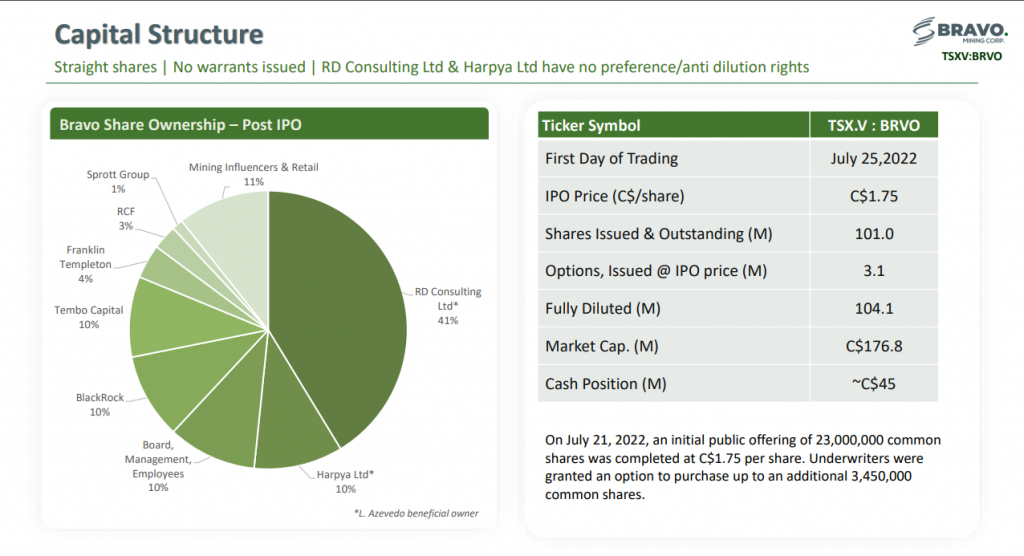
CORPORATE PRESENTATION: https://bravomining.com/pdf/20220801_BravoMining_CorporatePresentation.pdf
OFFICIAL PRESS RELEASE: https://bravomining.com/pdf/2022-07-26_NR.pdf
Highlights include 11.0m @ 6.50g/t PGM + Au (including 0.34g/t Rhodium), and 0.32% Ni Sulphide, and 8.6m @ 6.45g/t PGM + Au (including 0.36g/t Rhodium)
VANCOUVER, BC, July 26, 2022 /CNW/ – Bravo Mining Corp. (TSXV: BRVO), (“Bravo” or the “Company“) today announced it has received assay results from a further five diamond drill holes (“DDH”) (four infill drill holes and one twin drill hole), bringing the total to 42 drill holes (including four twin drill holes) completed to date at its wholly owned Luanga platinum group metals (palladium + platinum + rhodium) + gold + nickel (PGM+Au+Ni) project (“Luanga“), located in the Carajás Mineral Province, state of Pará, Brazil. Samples for a further 15 drill holes are already at the laboratory for analysis.
“We are very pleased with the successful launch of Bravo Mining on the TSXV, especially given current market conditions, and believe this underscores the quality of the Luanga Project and its management team. Results from our Luanga Phase 1 (25,500m) confirmation, infill, step out and twin hole drill program continue to both support the historical results and build our ongoing confidence in the Luanga deposit”, said Luis Azevedo, Chairman and CEO of Bravo. “We look forward to providing regular updates as our drilling and re-assay programs continue to ramp up, and our metallurgical and environmental baseline programs get underway.”
Highlights
- 42 DDH drilled to date, including 4 twin holes, for a total of 6,678m out of Phase 1 25,500m drilling program;
- 5,833 samples submitted for assay and results pending for 15 DDH;
- 5 drill rigs onsite; to be increased to 6 in August 2022;
- Assay results of the twin hole (the third of seven planned twin holes) closely correlate with the immediately adjacent VALE SA historic (“historic” or “historical”) drill hole in both tenor and mineralized thickness, while assays from the four planned drill holes aimed at infilling the existing wide spaced drilling, confirm the tenor, widths and continuity of mineralization seen in adjacent historic drill sections;
- Highlights of Bravo’s intercepts are tabulated below, with details attached.
| HOLE-ID | From(m) | To(m) | Thickness (m) | Pd(g/t) | Pt(g/t) | Rh(g/t) | Au (g/t) | Ni % (Sulphide) | PGM + Au (g/t) | TYPE |
| DDH22LU003 | 33.2 | 70.0 | 36.8 | 1.53 | 0.70 | 0.10 | 0.30 | 0.17 | 2.64 | FR |
| And | 89.0 | 94.2 | 5.2 | 1.51 | 0.72 | 0.11 | 0.17 | 0.15 | 2.52 | FR |
| DDH22LU004 | 78.6 | 91.6 | 13.0 | 1.63 | 0.77 | 0.14 | 0.06 | 0.13 | 2.60 | FR |
| DDH22LU007 | 105.6 | 131.0 | 25.4 | 2.17 | 1.11 | 0.19 | 0.17 | 0.20 | 3.64 | FR |
| Including | 120.0 | 131.0 | 11.0 | 3.84 | 1.98 | 0.34 | 0.33 | 0.32 | 6.50 | FR |
| DDH22LU008 | 0.0 | 8.6 | 8.6 | 3.39 | 2.66 | 0.36 | 0.03 | NA | 6.45 | Ox |
| And | 27.6 | 42.6 | 15.0 | 0.82 | 0.34 | 0.07 | 0.03 | NA | 1.25 | Ox |
| Including | 32.6 | 42.6 | 10.0 | 1.09 | 0.41 | 0.07 | 0.04 | NA | 1.60 | Ox |
| All ‘From’, ‘To’ depths, and ‘Thicknesses’ are downhole.Given the orientation of the holes and the mineralization, the intercepts are estimated to range from ~75 to 90% of true thickness.Ox = Oxide. FR = Fresh Rock. Recovery methods and results will differ based on the type of mineralization.NA: Not Applicable as intercept is oxide or a mix of oxide and fresh rock mineralization. |
Luanga Drill Program
The Phase 1 drill program at Luanga is designed to confirm, infill and step out from the previously defined mineralization in order to increase confidence in the geological model and provide the basis for future mineral resource estimates.
As part of the Phase 1 program, Bravo has received final assay results (including palladium, platinum, rhodium, gold and nickel sulphide) for the third twin hole and the first four infill drill holes (shown below and listed in Schedule 1). Samples were submitted to ALS Brasil Limitada’s (“ALS“) preparatory laboratory in Parauapebas, located approximately 72km from Luanga, and then sent to their laboratories in Peru and Vancouver for assaying (Schedule 2).
Drilling by Bravo on new infill sections has, in several parts of the Luanga deposit, intersected zones containing significant amounts of coarser disseminated sulphides not previously observed in historic drilling. An example is shown in the photo below of samples from drill hole DDH22LU039 (assays pending). In some cases, these zones also include narrow bands of semi-massive sulphides. Pending assay results will determine how these zones correlate to grades.

A comparison of the original historic intercept with the Bravo twin hole intercept is tabulated below. Bravo’s twin hole intercept closely correlates with the adjacent historic drill hole in both thicknesses and grade, noting that Bravo nickel grades are for sulphide nickel which is representative of actual potentially recoverable (by froth flotation treatment) nickel, and does not include non-recoverable silicate nickel whereas VALE’s assays were total nickel, including both sulphide and non-recoverable silicate nickel.
Comparison of assay results from Bravo twin diamond drill hole of historic VALE SA diamond drill hole
| TWIN of Historic Hole PPT-LUAN-FD0069 | |||||
| HOLE-ID | From(m) | To(m) | Thickness (m) | HISTORIC SGSPGM + Au (g/t) | BRAVO ALSPGM + Au (g/t) |
| DDH22LU007 | 105.6 | 131.0 | 25.35 | 3.64 | |
| PPT-LUAN-FD0036 | 99.0 | 124.0 | 25.00 | 3.88 | |
| All From/To depths, and Thicknesses are downhole.Given the orientation of the holes and the mineralization, the intercepts are estimated to range from ~75 to 90% of true thickness. |
Drilling Progress
Bravo now has five diamond drill rigs operating at Luanga, with the sixth rig off site for servicing. The Phase 1 drill program is focused on confirming the results of the extensive historic drilling that included 252 core holes aggregating 50,353m completed by the previous owner in the early 2000s. The footprint of the Luanga deposit encompasses 238 of these holes. Bravo has now completed 42 holes (aggregating 6,678m of drilling) including four twin holes. Holes are being systematically logged, sampled and sent for assay. To date, 5,833 samples have been submitted for assay. Assay results are currently pending for 15 drill holes.
Drill holes DDH22LU003, 004, 007 and 008 all successfully intersected the main Luanga mineralized zone, which lies at the contact between the mafic and ultramafic rock sequences, confirming the tenor, width and continuation of mineralization seen in nearby wide spaced historic drill sections. DDH22LU008 was collared on top of the main mineralized zone, intersecting grade from surface, while DDH22LU002 was drilled too far north, intersecting the mafic sequence in the hangingwall, which still contains low grade zones of mineralization.
Complete Table of Assay Results
| HOLE-ID | From(m) | To(m) | Thickness (m) | Pd(g/t) | Pt(g/t) | Rh(g/t) | Au (g/t) | Ni % (Sulphide) | PGM + Au (g/t) | TYPE |
| DDH22LU002 | 99.6 | 131.0 | 32.4 | 0.24 | 0.27 | 0.03 | <0.01 | <0.01 | 0.54 | FR |
| DDH22LU003 | 0.0 | 2.4 | 2.4 | 0.71 | 0.28 | 0.05 | 0.07 | NA | 0.92 | Ox |
| And | 25.4 | 28.2 | 2.8 | 0.57 | 0.25 | 0.04 | 0.07 | NA | 0.92 | Ox |
| And | 33.2 | 70.0 | 36.8 | 1.53 | 0.70 | 0.10 | 0.30 | 0.17 | 2.64 | FR |
| And | 75.0 | 82.0 | 7.0 | 0.20 | 0.09 | 0.02 | 0.06 | 0.13 | 0.37 | FR |
| And | 89.0 | 94.2 | 5.2 | 1.51 | 0.72 | 0.11 | 0.17 | 0.15 | 2.52 | FR |
| And | 115.5 | 138.0 | 22.5 | 0.24 | 0.21 | 0.01 | <0.01 | <0.01 | 0.47 | FR |
| DDH22LU004 | 78.6 | 91.6 | 13.0 | 1.63 | 0.77 | 0.14 | 0.06 | 0.13 | 2.60 | FR |
| And | 60.6 | 76.6 | 16.0 | 0.24 | 0.13 | 0.02 | 0.04 | 0.06 | 0.42 | FR |
| And | 126.6 | 130.2 | 3.6 | 0.24 | 0.75 | 0.12 | <0.01 | <0.01 | 1.11 | FR |
| DDH22LU007 | 100.6 | 131.0 | 30.4 | 1.90 | 0.97 | 0.17 | 0.14 | 0.20 | 3.19 | FR |
| Including | 105.6 | 131.0 | 25.4 | 2.17 | 1.11 | 0.19 | 0.17 | 0.20 | 3.64 | FR |
| Including | 120.0 | 131.0 | 11.0 | 3.84 | 1.98 | 0.34 | 0.33 | 0.32 | 6.50 | FR |
| DDH22LU008 | 0.0 | 8.6 | 8.6 | 3.39 | 2.66 | 0.36 | 0.03 | NA | 6.45 | Ox |
| And | 27.6 | 42.6 | 15.0 | 0.82 | 0.34 | 0.07 | 0.03 | NA | 1.25 | Ox |
| Including | 32.6 | 42.6 | 10.0 | 1.09 | 0.41 | 0.07 | 0.04 | NA | 1.60 | Ox |
| All From To depths, and Thicknesses are downholeGiven the orientation of the holes and the mineralization, the intercepts are estimated to range from ~75 to 90% of true thickness.Ox = Oxide. FR = Fresh Rock. Recovery methods and results will differ based on the type of mineralizationNA: Not Applicable as intercept is oxide or a mix of oxide and fresh rock mineralization. |
About Bravo Mining Corp.
Bravo is a Canada and Brazil-based mineral exploration and development company focused on advancing its Luanga PGM+Au+Ni Project in the world-class Carajás Mineral Province of Brazil.
The Luanga Project benefits from being in a location close to operating mines, with excellent access and proximity to existing infrastructure, including road, rail and clean and renewable hydro grid power. The project area was previously de-forested for agricultural grazing land. Bravo’s current Environmental, Social and Governance activities includes replanting trees in the project area, hiring and contracting locally, and ensuring protection of the environment during its exploration activities.
Bravo was founded by a management team and board with extensive Brazilian and PGM exploration, permitting, project financing, construction and operating experience. This includes Luis Azevedo, Executive Chairman & CEO; Simon Mottram, President; Alex Penha, EVP Corporate Development; and Independent Directors, Dr. Nicole Adshead-Bell (Lead Director), Stuart Comline, Tony Polglase and Stephen Quin.
Technical Disclosure
Technical information in this news release has been reviewed and approved by Simon Mottram, F.AusIMM (Fellow Australia Institute of Mining and Metallurgy), President of Bravo Mining Corp. who serves as the Company’s “qualified person”, as defined in National Instrument 43-101 – Standards of Disclosure for Mineral Projects (“NI 43-101“). Mr. Mottram has verified the technical data and opinions contained in this news release.
Historical Information
This news release includes historical drilling and historical assay results generated by the prior owner of Luanga that have been reviewed by the Company’s geological team. The Company’s review of the historical records and information reasonably substantiate the validity of the historical information presented in this news release; however, the Company cannot directly verify the accuracy of the historical data, including the procedures used for sample collection and analysis. Therefore, the Company encourages investors to exercise appropriate caution when evaluating the historical results. Further data review, drilling of twin holes and infill drilling is underway in order to verify the validity of the data for use, alongside Bravo’s new drilling and re-assay data, in any future NI 43-101 compliant mineral resource estimate.
Forward Looking Statements
This news release contains forward-looking information which is not comprised of historical facts. Forward-looking information is characterized by words such as “closely”, “confirm”, “continuity”, “correlate”, “designed”, “determine”, “increase confidence”, “look forward”, “pending”, “ramp up” and other similar words, phrases or statements that certain events or conditions “may” or “will” occur. In particular, this news release contains forward-looking information pertaining to the Company’s ongoing re-assay and drill programs; the expected arrival of additional drill rigs and delivery of historic core; and the Company’s plans in respect thereof. Forward-looking information involves risks, uncertainties and other factors that could cause actual events, results, and opportunities to differ materially from those expressed or implied by such forward-looking information. Factors that could cause actual results to differ materially from such forward-looking information include, but are not limited to, changes in the state of equity and debt markets, fluctuations in commodity prices, delays in obtaining required regulatory or governmental approvals, environmental risks, limitations on insurance coverage; and other risks and uncertainties involved in the mineral exploration and development industry. Forward-looking information in this news release is based on the opinions and assumptions of management considered reasonable as of the date hereof, including, but not limited to, the assumption that the additional drill rigs and historic core will arrive within the anticipated timeframe; final drill and assay results will be in line with management’s expectations; that activities will not be adversely disrupted or impeded by regulatory, political, community, economic, environmental and/or healthy and safety risks; that the Luanga Project will not be materially affected by potential supply chain disruptions; and general business and economic conditions will not change in a materially adverse manner. Although the Company believes that the assumptions and factors used in preparing the forward-looking information in this news release are reasonable, undue reliance should not be placed on such information. The Company disclaims any intention or obligation to update or revise any forward-looking information, other than as required by applicable securities laws.
Schedule 1: Drill Hole Collar Details
| HOLE-ID | Company | East (m) | North (m) | RL (m) | Datum | Depth (m) | Azimuth | Dip | |
| DDH22LU002 | Bravo | 657099.99 | 9339714.97 | 277.355 | SIRGAS2000 UTM22S | 152.35 | 360.00 | -60.00 | |
| DDH22LU003 | Bravo | 657199.98 | 9339715.45 | 254.52 | SIRGAS2000 UTM22S | 150.50 | 360.00 | -60.00 | |
| DDH22LU004 | Bravo | 657300.03 | 9339777.59 | 252.05 | SIRGAS2000 UTM22S | 203.40 | 360.00 | -60.00 | |
| DDH22LU007 | Bravo | 659092.89 | 9341002.10 | 241.231 | SIRGAS2000 UTM22S | 230.40 | 330.00 | -60.00 | |
| DDH22LU008 | Bravo | 659827.13 | 9341623.78 | 242.572 | SIRGAS2000 UTM22S | 150.60 | 330.00 | -60.00 |
Schedule 2: Assay Methodologies and QAQC
Samples followed chain of custody between collection, processing and delivery to the ALS laboratory in Parauapebas, state of Pará, Brazil. The drill core was delivered to the core shack at Bravo’s Luanga site facilities and processed by geologists who inserted certified reference materials, blanks and duplicates into the sampling sequence. Drill core was half cut and placed in secured polyurethane bags, then in security-sealed sacks before being delivered directly from the Luanga site facilities to the Parauapebas ALS laboratory by Bravo staff. Additional information about the methodology can be found on the ALS global website (ALS) in the analytical guides. Information regarding preparation and analysis of historic drill core is also presented in the table below, where the information is known.
Quality Assurance and Quality Control (“QAQC“) is maintained internally at the lab through rigorous use of internal certified reference materials, blanks, and duplicates. An additional QAQC program is administered by Bravo using certified reference materials, duplicate samples and blank samples that are blindly inserted into the sample batch. If a QAQC sample returns an unacceptable value an investigation into the results is triggered and when deemed necessary, the samples that were tested in the batch with the failed QAQC sample are re-tested.
| Bravo ALS | |||||
| Preparation | Method | Method | Method | Method | |
| For All Elements | Pt, Pd, Au | Rh | Ni-Sulphide | Trace Elements | |
| PREP-31B | PGM-ICP27 | Rh-MS25 | Ni-ICP05 | ME-ICP61 | |
| Historic Drill Assaying SGS Geosol | |||||
| Preparation | Method | Method | Method | Method | |
| For All Elements | Pt, Pd, Au | Rh | TOTAL Ni | Trace Elements | |
| Crushed to <200 mesh | FA30A | FA30B | ICP-117 | ICP-117 | |
SOURCE Bravo Mining Corp.









